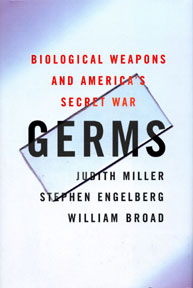Germs: Biological Weapons and America's Secret War
Germs: Biological Weapons and America's Secret War is a comprehensive examination of the history, development, and ethical implications surrounding the use of biological weapons in the context of United States national security and warfare. This article delves into the key aspects of the book, including its exploration of bioterrorism, the biological warfare programs of the United States, and the challenges posed by emerging pathogens.
Overview[edit | edit source]
Germs: Biological Weapons and America's Secret War provides an in-depth look at the secretive world of biological warfare and biodefense strategies of the United States. The book covers a broad spectrum of topics, including the history of biological warfare, the development of biological weapons, the ethical and legal debates surrounding their use, and the ongoing efforts to protect against bioterrorist attacks. It also examines the role of various government agencies, such as the Central Intelligence Agency (CIA) and the Department of Defense (DoD), in developing and countering biological threats.
Historical Context[edit | edit source]
The book traces the history of biological weapons from ancient times to the modern era, highlighting significant events and developments. It discusses the use of biological agents in warfare, the evolution of international laws and treaties aimed at curbing the proliferation of biological weapons, such as the Biological Weapons Convention (BWC), and the challenges in enforcing these agreements.
Biological Weapons Programs[edit | edit source]
A significant portion of Germs: Biological Weapons and America's Secret War is dedicated to exploring the United States' involvement in the research and development of biological weapons. This includes discussions on the controversial Project MKUltra, the use of anthrax and other pathogens in weaponized forms, and the secretive nature of these programs. The book also addresses the dual-use dilemma of biotechnological research, where scientific advancements can be used for both beneficial and harmful purposes.
Bioterrorism and National Security[edit | edit source]
The threat of bioterrorism is a central theme of the book. It examines how non-state actors, including terrorist groups, could potentially acquire and use biological agents to carry out attacks. The book assesses the vulnerability of the United States to such threats and the measures taken by the government to prevent and respond to bioterrorist incidents, including the establishment of the Office of Homeland Security.
Ethical and Legal Considerations[edit | edit source]
Germs: Biological Weapons and America's Secret War delves into the ethical and legal challenges posed by the development and potential use of biological weapons. It discusses the moral implications of using disease as a weapon and the international legal framework designed to prevent the proliferation and use of biological agents in warfare.
Conclusion[edit | edit source]
The book concludes with a discussion on the future of biological warfare and biodefense, emphasizing the need for continued vigilance, international cooperation, and ethical considerations in the face of evolving biological threats. It calls for a balanced approach that safeguards national security while respecting human rights and international law.
Translate: - East Asian
中文,
日本,
한국어,
South Asian
हिन्दी,
தமிழ்,
తెలుగు,
Urdu,
ಕನ್ನಡ,
Southeast Asian
Indonesian,
Vietnamese,
Thai,
မြန်မာဘာသာ,
বাংলা
European
español,
Deutsch,
français,
Greek,
português do Brasil,
polski,
română,
русский,
Nederlands,
norsk,
svenska,
suomi,
Italian
Middle Eastern & African
عربى,
Turkish,
Persian,
Hebrew,
Afrikaans,
isiZulu,
Kiswahili,
Other
Bulgarian,
Hungarian,
Czech,
Swedish,
മലയാളം,
मराठी,
ਪੰਜਾਬੀ,
ગુજરાતી,
Portuguese,
Ukrainian
Navigation: Wellness - Encyclopedia - Health topics - Disease Index - Drugs - World Directory - Gray's Anatomy - Keto diet - Recipes
Search WikiMD
Ad.Tired of being Overweight? Try W8MD's physician weight loss program.
Semaglutide (Ozempic / Wegovy and Tirzepatide (Mounjaro / Zepbound) available.
Advertise on WikiMD
WikiMD is not a substitute for professional medical advice. See full disclaimer.
Credits:Most images are courtesy of Wikimedia commons, and templates Wikipedia, licensed under CC BY SA or similar.Contributors: Prab R. Tumpati, MD

